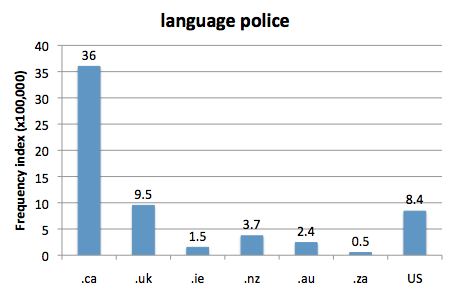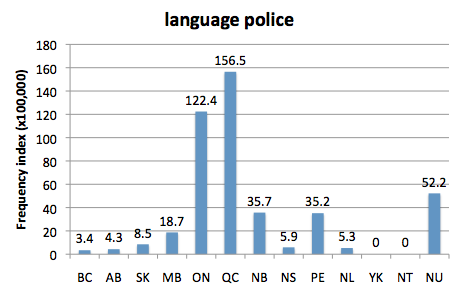DCHP-2
language police DCHP-2 (October 2016)
n. — French relations, informal, derogatory
a nickname for the officials in Quebec responsible for enforcing provincial language laws.
Type: 4. Culturally Significant — Language police is a term used by Anglophones in Quebec and in the Rest of Canada to refer to the officials of the Office québécois de la langue française, who enforce the Quebec language laws, e.g. Bill 101 or Bill 178, which requires commercial signs to make French words more prominent than English ones (see Image 1, see the Canadian Encyclopedia reference). These officials are civil servants and not part of the police force, but have been nicknamed language police by English speakers and the English press (see, e.g. the 2010 quotation), who perceive the language laws, such as the sign laws, to infringe on English minority rights (see, e.g. the 1977 quotation).
The form language police did not originate in Canada, however, as the term has been used previously elsewhere to refer to groups or persons seeking to impose language standards (see OED-3, s.v. "language police" [a]). In Canada, the term has acquired a narrower meaning and today language police is most prevalent in Canada (see Chart 1). Although the term is known nationally, it is most often found in Quebec and Ontario (see Chart 2).
The term shows interesting, yet quite varied connotations. On the one hand, it points to the tensions between French- and English-speaking communities in Quebec, as it is used disparagingly by some English speakers. For the Parti Québécois, which enacted the Charter of the French Language or Bill 101 that engendered the language policies, and for others, the laws, on the other hand, are considered essential to maintaining French cultural integrity in the face of encroachment by English North American linguistic and cultural practices.
See also COD-2, s.v. "language police" (1), which is marked "Cdn (Que.)", and OED-3, s.v. "language police" (b), which is marked "Canad.".See also: Parti Québécois sign law Rest of Canada tongue trooper Bill 101 Charter of the French Language
References:
- COD-2
- Canadian Encyclopedia s.v. "Bill 178" Accessed 26 Apr. 2016
- OED-3
Images:

Image 1: Signs such as this one in a supermarket are enforced by language police (Source: Wikimedia Commons, Photo: Skimel)
Chart 1: Internet Domain Search, 15 Aug. 2012
Chart 2: Regional Domain Search, 12 Feb. 2016